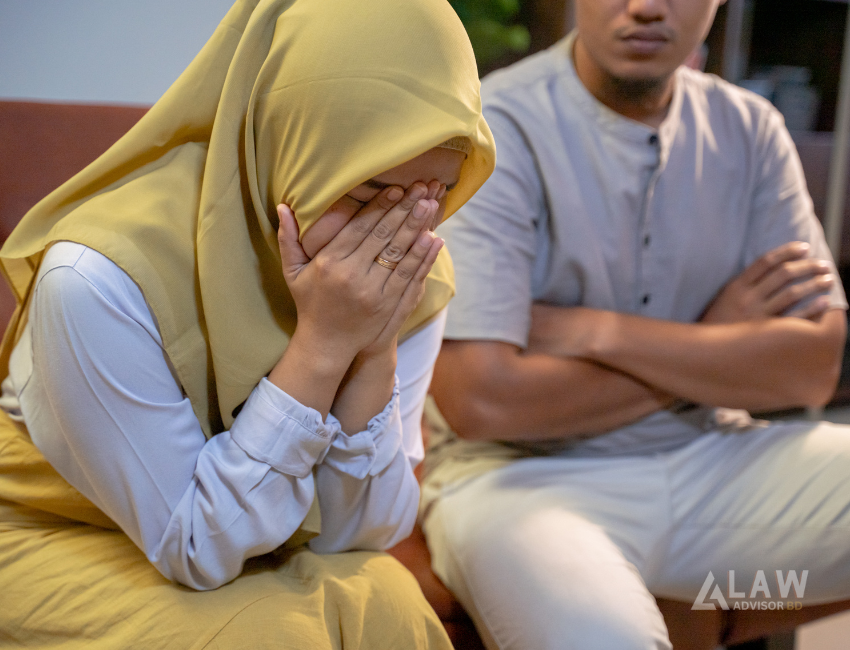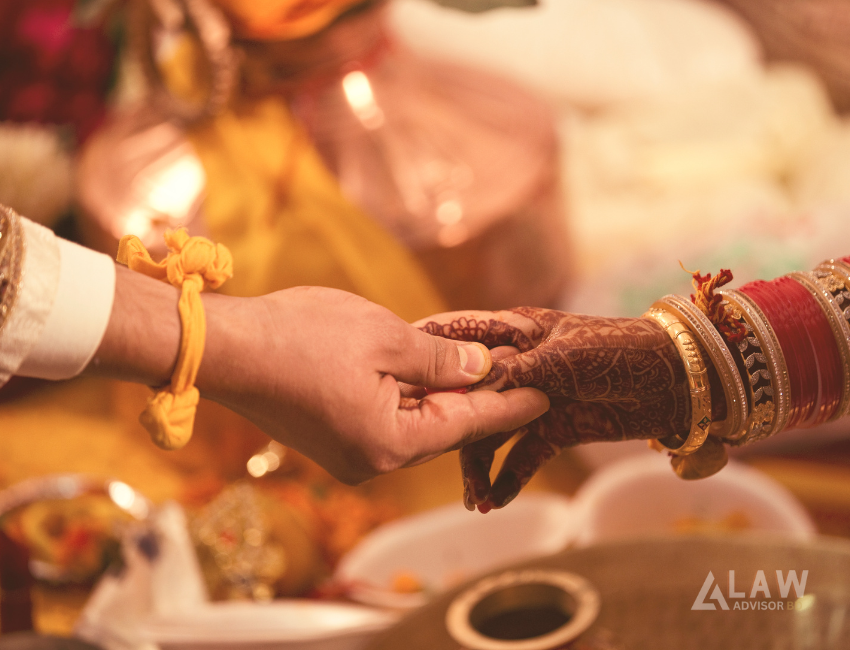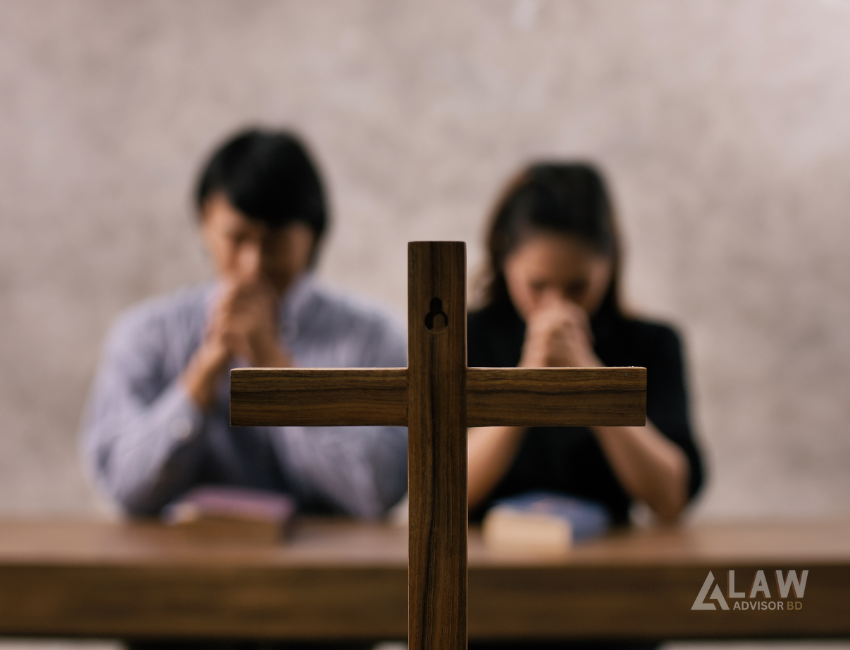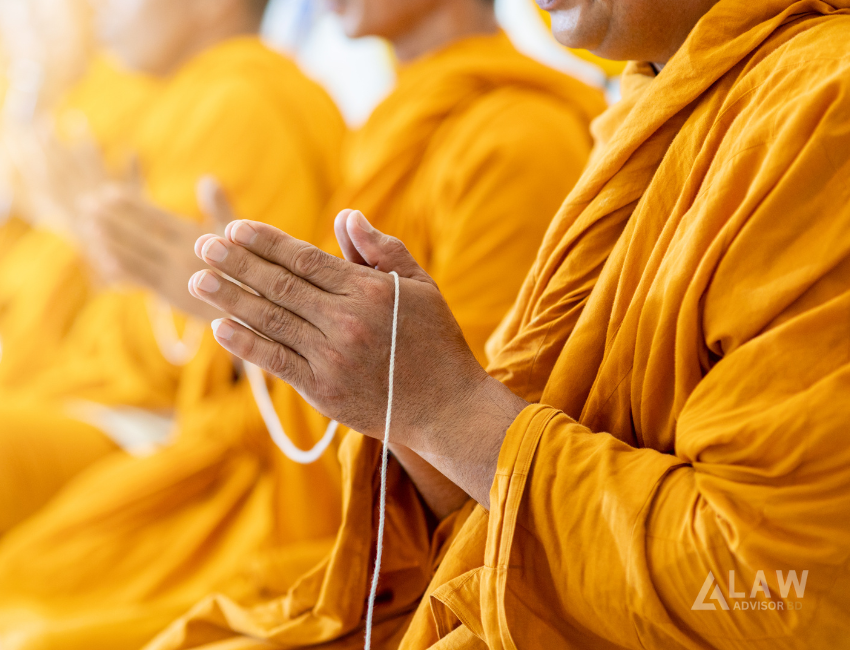Divorce Laws and Procedures in Bangladesh - A Complete Guide for All Religions in Bangladesh
On This Page
- Muslim Divorce Laws and Procedures in Bangladesh
- Divorce Laws and Acts for Muslims in Bangladesh
- Types of Divorces for Muslims in Bangladesh
- Step-by-Step Divorce Procedure for Muslim Husbands in Bangladesh
- Divorce Procedure for Muslim Wives in Bangladesh
- Some Important Rules Related to Muslim Divorce Registration Procedures in Bangladesh
- Documents Needed for a Muslim Divorce Registration Process
- Hindu Divorce Laws and Procedures in Bangladesh
- Key Aspects of Hindu Divorce Laws in Bangladesh
Muslims, Hindus, Christians, and Buddhists in Bangladesh don’t follow common laws or procedures for divorce, unlike non-religious activities. Every religion has its specific divorce laws and procedures in Bangladesh based on its religious beliefs, teachings, norms, and customs.
However, if you are considering a divorce or just want to stay aware, you have to correctly know the laws and procedures related to your religion in Bangladesh. Because, If you give or take a divorce without following the correct procedures, it can affect both parties.
Some of the best divorce lawyers prepared this guide. Here, they have included everything regarding divorce laws and procedures in Bangladesh for people of all religions. Know the prevailing divorce laws and procedures step-by-step to avoid any bad situations or complexities resulting from a divorce in the future.
This is a complete and comprehensive guide prepared by our specialist divorce lawyers in Bangladesh. We want you to know the right divorce law in Bangladesh to ensure a fair outcome.
Note that the divorce procedure in Bangladesh is not straightforward. The procedure involves several steps and conditions. So, carefully understand these steps and conditions with our divorce law experts. Hence you can give or take a divorce accurately and avoid future consequences.
Get an Appointment Today!
Muslim Divorce Laws and Procedures in Bangladesh

In Bangladesh, Islamic law, the Muslim Family Laws Ordinance of 1961, and the Family Courts Ordinance of 1985 govern the divorce for Muslims. Divorce for Muslims is a structured process to ensure fairness. Both husbands and wives have the right to initiate a divorce, in different procedures.
Divorce Laws and Acts for Muslims in Bangladesh
Muslim divorce is regulated by the following laws and acts:
- Muslim Family Laws Ordinance, 1961: This ordinance governs many aspects of family life for Muslims, including divorce. It introduces regulations that streamline the divorce process and ensure fairness.
- The Family Courts Ordinance, 1985: This law establishes the Family Court system, which has jurisdiction over divorce cases. It provides legal procedures for resolving disputes regarding divorce, maintenance, and child custody.
- The Dissolution of Muslim Marriages Act, 1939: This act allows Muslim women to seek judicial divorce under specific grounds such as cruelty or abandonment.
- The Muslim Marriages and Divorces (Registration) Act, 1974: This act allows all Muslim citizens of Bangladesh to apply for divorce under Muslim Law.
Types of Divorces for Muslims in Bangladesh
Muslim divorce can take different forms, such as Talaq by the husband or divorce initiated by the wife. Know the various types of divorce, relevant laws, and step-by-step procedures for both husbands and wives below.
Muslim law in Bangladesh admits several types of divorce, including:
- Talaq (husband’s power): This is the most common form of divorce initiated by the husband. It can be oral or written, but it must follow the legal procedure.
- Talaq-e-Tafweez or Talaq-e-Tafweedh (wife’s power): This allows a wife to initiate divorce if the husband has granted her this right at the time of marriage.
- Khula or Mubarat (mutual consent): A mutual agreement between the husband and wife to dissolve the marriage peacefully.
- Faskh-e-Nikah: A judicial divorce that a wife can seek through the courts under specific conditions, such as cruelty, desertion, or failure to provide maintenance.
There are some other processes. Each form of divorce has specific conditions and legal steps, as outlined by Islamic law and the Family Courts Ordinance of Bangladesh.
Step-by-Step Divorce Procedure for Muslim Husbands in Bangladesh
Muslim husbands in Bangladesh have the following legal options to give a divorce:
- Pronouncement of Talaq: A Muslim husband can initiate divorce by pronouncing “Talaq” either orally or in writing. The Talaq must be communicated clearly to the wife.
- Notification to Chairman or Union Parishad: The husband must send a written notice of the Talaq to the local Union Parishad (local government council) within seven days of pronouncing the divorce. Failing to do so can invalidate the Talaq.
- Arbitration Council Meeting (within 30 days of Notice): The Union Parishad will then form an Arbitration Council to attempt reconciliation between the husband and wife. This is mandatory before the divorce becomes final.
- Waiting Period (Iddat): After pronouncing Talaq, the wife must observe an Iddat period, which typically lasts for three months (three menstrual cycles). During this time, efforts for reconciliation can continue, and if the couple reconciles, the Talaq may be revoked.
- Finality of Divorce: If no reconciliation happens within the Iddat period, the divorce becomes final. The husband must provide the wife with her dower (Mehr) if it hasn’t been paid already.
This step-by-step process ensures that divorce is not taken lightly and encourages efforts for reconciliation.
Divorce Procedure for Muslim Wives in Bangladesh
Muslim wives in Bangladesh have the following legal rights to get a divorce:
- Talaq-e-Tafweez: If the right to divorce has been delegated to the wife (usually at the time of marriage), she can initiate divorce by following the same process as the husband. This includes notifying the Union Parishad and observing the Iddat period.
- Judicial Divorce (Faskh): If the wife has not been granted the right to initiate Talaq, she can still seek a judicial divorce through the Family Court. She must present valid grounds, such as cruelty, failure to provide maintenance, or desertion, to be granted the divorce.
- Dissolution of Muslim Marriages Act, 1939: Under this act, the wife can apply to the Family Court for dissolution of marriage. Valid reasons include harm, cruelty, the husband’s absence, or failure to perform marital duties.
- Arbitration and Reconciliation: The court may attempt to reconcile the couple before finalizing the divorce. However, if reconciliation fails, the court will proceed with granting the divorce.
- Maintenance and Dower: Following the divorce, the wife is entitled to receive her dower and, in some cases, maintenance, depending on the circumstances.
Note that both husband and wife should retain a copy of the divorce certificate. This document is important for any future legal matters, such as remarriage or disputes over maintenance, child custody, or property.
Some Important Rules Related to Muslim Divorce Registration Procedures in Bangladesh
- Upon receiving an application, a Nikah Registrar may record a divorce decreed under Muslim law within his authority.
- The individual or people who have or have completed the divorce must submit an oral application for divorce registration.
- A document registered under The Registration Act, 1908, in which the husband gave the wife the authority to file for divorce, or an attested copy of an entry in the marriage register proving that the delegation was made, must be presented before the Nikah Registrar registers a divorce known as Talaq-e-tafweez.
- If the Nikah Registrar declines to register a divorce, the person or people who sought the registration may appeal to the Registrar within thirty days of the denial.
Documents Needed for a Muslim Divorce Registration Process
Collect the following essential documents before starting a Muslim divorce registration process:
- A copy of Kabin-Nama (the standard marriage contract form in Bangladesh)
- Copies of the husband and wife’s NID (National Identification Number).
- NID copies of two male witnesses.
- A photocopy, if any affidavit is prepared by a lawyer.
Hindu Divorce Laws and Procedures in Bangladesh

Hindu marriage and family laws are established based on Hindu Dharma Shastra and Hindu family laws and differ significantly from those of other religions in Bangladesh.
Hindu law did not recognize divorce as Hindus believe in the indissolubility of marriage. In Hinduism or Hindu Dharma Shastra, marriage is a heavenly union that cannot be broken through divorce. Hinduism allows the dissolution of marriage or separation, though under certain grounds.
Key Aspects of Hindu Divorce Laws in Bangladesh
There are some key aspects of Hindu dissolution of marriage or separation laws in Bangladesh that you be aware of:
- No Specific Legislation for Divorce: Hindu personal law, as applied in Bangladesh, traditionally does not have provisions for divorce. Marriage, under Hindu law, is considered a sacred and permanent union that cannot be dissolved.
- Separation and Abandonment: In practice, when couples cannot continue living together, they may opt for separation rather than legal divorce. Abandonment or informal separation is sometimes followed when the marriage becomes untenable, but this does not provide legal recognition or rights for remarriage.
- Inheritance and Property Issues: Hindu women in Bangladesh face legal complications regarding property and inheritance when they are separated from their husbands. Property disputes and issues of maintenance can become complex and legal recourse is limited.
Laws and Provisions Related to Hindu Divorces in Bangladesh
For Hindus in Bangladesh, no distinct law governs Hindu marriage and divorce. So, the legal framework and process for Hindu marriage dissolution or separation follows traditional Hindu Dharma Shastra and related acts and provisions in Bangladesh. These acts and provisions include:
- Hindu Marriage Registration Act 2012
Grounds for a Hindu Wife to Ask for a Dissolution of Marriage with Separate Residence and Maintenance in Bangladesh
According to Hindu Dharma Shastra, Hindus consider divorce to be contradictory to the philosophy of Hinduism. However, a Hindu wife can ask for separation and maintenance from her husband on the following accepted grounds:
- Adultery: If the husband is involved in an extramarital relationship or commits adultery.
- Desertion by the Husband: If the husband abandons or deserts his wife without her consent and valid reason.
- Cruelty: If her husband is physically or mentally cruel to her. This includes domestic violence, verbal abuse, or emotional torture.
- Neglect or Refusal to Maintain: If the husband refuses or fails to maintain his wife financially, she can claim separate residence and maintenance.
- Serious Illness: If the husband suffers from a serious illness that makes cohabitation unsafe or harmful for the wife.
- Moral or Religious Grounds: If the husband forces the wife to act against her religious or moral principles.
- Impotence or Inability to Fulfill Marital Obligations: If her husband is impotent or unable to fulfill his marital duties.
Note that if a Hindu wife converts to another religion or ignores the court’s decision over her claim, she will not be eligible to get a separate home or maintenance from her husband
Step-by-Step Procedure of Dissolution of Marriage and Separation for Hindu Couples in Bangladesh (Informal or Court-Sanctioned)
Hindu couples can approach informal or court-sanctioned separation under specific grounds. Below is the step-by-step procedure for the dissolution of marriage for Hindu couples in Bangladesh.
- Mutual Agreement or Separation: Hindu couples in Bangladesh may decide to live separately or agree upon a mutual separation if the marriage becomes unsustainable. This informal separation does not mean a legal divorce but may serve as a socially or religiously accepted solution.
- Seek Relief under Civil Law: In certain cases, a Hindu couple may register their marriage under The Special Marriage Act, 1872. This act allows legal divorce. A divorce petition under this act can be filed in a civil court by either party on valid grounds.
- Annulment of Marriage: If either spouse seeks to dissolve the marriage, annulment is an option, but only under valid circumstances. The aggrieved party must file a petition in court to request an annulment. The court will only grant it if they are convinced of the grounds.
- File the Divorce Petition: Once the decision to divorce is made, the aggrieved party must file a divorce petition in the relevant civil court. This petition should outline the grounds for divorce and include necessary documents such as the marriage certificate (if applicable) and evidence supporting the claims (e.g., testimonies of cruelty, desertion, etc.).
- Court Proceedings: After the petition is filed, the court sets a date for hearings. Both parties are required to attend, and they may be asked to present their arguments, evidence, and testimonies.
- Discussion of Negotiations between Spouses: The court may attempt reconciliation between the spouses. But if it is clear that the marriage cannot be sustained, the court will proceed with the case.
- Judgment and Final Decree: If the court is satisfied that the grounds for divorce are valid and irreconcilable, it will issue a decree for the dissolution of the marriage. In case of annulment, the court’s final judgment formalizes the dissolution.
- Post-Divorce Considerations: The court may address issues such as maintenance or alimony, and custody of children, following the divorce decree. The court’s decision on these matters depends on the circumstances and financial standing of both parties.
Note that the dissolution of a Hindu marriage is complex due to religious constraints. Mostly, Hindu couples resort to informal separation. They seek resolution through mutual agreement, with religious or community elders mediating disputes.
Christian Divorce Laws and Procedures in Bangladesh

Like the Hindu religion, marriage is considered an eternal and lifelong bond in the Christian religion. Christian religion discourages it due to the belief in the sanctity of marriage. In Christianity, marriage is seen as a sacred covenant not only between the couple but also with God. Marriage is a lifelong commitment that mirrors the union between Christ and the Church.
So, divorce among Christians is less common compared to other religious communities in Bangladesh. Still, on certain limited grounds, Christians can divorce (dissolution of marriage) their spouses. So, if you are a Christian who is considering a divorce, have a clear knowledge of Christian divorce laws and procedures in Bangladesh.
Laws and Provisions Related to Christian Divorces (dissolution of marriage) in Bangladesh
Christian divorce laws and procedures in Bangladesh are governed by:
These laws outline legal grounds and procedures for divorce among Christians. These laws aim to protect the rights of both parties and conserve the religious values of the Christian faith.
Grounds for Christian Divorce in Bangladesh
Christian divorce in Bangladesh is not permitted on any grounds other than those explicitly outlined in the Divorce Act of 1869. The major grounds include:
- Adultery: If a spouse commits an extramarital relationship or adultery, the other spouse can opt for divorce.
- Conversion to Another Religion: If one spouse renounces Christianity and converts to another religion.
- Cruelty: A spouse subjected to physical or emotional cruelty can file for divorce under Christian law. This covers a range of abusive behaviors that make the marriage unbearable.
- Desertion: If one spouse willfully deserts the other for a continuous period of at least two years without reasonable cause, this can serve as grounds for divorce.
- Infidelity or Bigamy: If one spouse marries someone else while still being legally married, the other spouse can file for divorce.
The Procedure of a Christian Divorce in Bangladesh (Dissolution of Marriage)
Christians in Bangladesh can choose one of the 3 procedures offered under the Divorce Act of 1869:
- Dissolution of Marriage
- Nullity of Marriage
- Judicial Separation
The divorce process for Christians in Bangladesh includes certain legal steps in any of the above-mentioned procedures as prescribed by the Divorce Act of 1869. Each step ensures that the divorce is legally right and fair to both parties. Below is the step-by-step procedure for the dissolution of marriage for Christian couples in Bangladesh.
- File a Petition: The spouse seeking divorce must file a petition with the Family Court. This petition must specify the grounds for divorce, such as adultery, desertion, or cruelty. It is crucial to present all necessary evidence to support the claims.
- Service of Notice: After the petition is filed, the court serves a notice to the other spouse, informing them of the divorce proceedings. This ensures that both parties have an equal opportunity to participate in the process.
- Mediation and Reconciliation: Before proceeding with the divorce, the court may suggest mediation or reconciliation between the spouses. This step is particularly important in Christian marriages, where reconciliation is often encouraged.
- Trial: If reconciliation efforts fail, the court schedules a trial where both parties present their arguments and evidence. Witnesses may also be called to testify. The trial aims to determine the validity of the divorce petition.
- Decree Nisi: If the court finds the grounds for divorce valid, it issues a Decree Nisi, a provisional order that declares the marriage dissolved. However, this decree is not final, and both parties have the opportunity to appeal the decision.
- Decree Absolute: After six months, if no appeal is filed, the court issues a Decree Absolute, which finalizes the divorce. The couple is now legally separated.
- Custody and Maintenance: The court may also decide on issues like child custody, maintenance, and alimony. Christian divorce law in Bangladesh aims to ensure that the welfare of children is prioritized, and the financial well-being of both parties is secured.
Key Considerations for Christian Divorce in Bangladesh
There are some important things to consider during a Christian divorce. The key considerations include:
- Religious Sensitivity: Christian divorce is a sensitive issue due to its religious implications. You should seek legal advice from a professional Christian divorce lawyer in Bangladesh.
- Professional Legal Support: Divorce laws have complexities and a divorce process requires proper documentation and evidence. So, get assistance from a specialist Christian divorce law expert.
- Child Custody and Property Distribution: Divorce proceedings often involve disputes over child custody and the division of assets. Christian divorce laws in Bangladesh ensure that these matters are handled fairly, with the best interests of the children in mind.
Buddhist Divorce Laws and Procedures in Bangladesh

Divorce is not forbidden in Buddhism, unlike Hinduism. Buddhism generally promotes the values of compassion, tolerance, and understanding in marriage. But divorce is often considered a last resort after efforts at reconciliation have been made.
Buddhism emphasizes non-harm and the avoidance of suffering, So, divorce may be viewed as acceptable in Buddhism when the marriage causes significant emotional or physical harm to one or both partners.
Laws and Provisions Related to Buddhist Divorces in Bangladesh
Buddhists in Bangladesh, like other religious communities, are governed by specific laws when it comes to marriage and divorce. However, there is no distinct legal framework or act solely dedicated to Buddhist divorce in Bangladesh.
Instead, Buddhists in Bangladesh typically follow general family and marriage laws. The Buddhist divorce laws and procedures in Bangladesh follow the acts below:
Grounds for Divorce for Buddhists in Bangladesh
Buddhists follow the general provisions of family laws (The Family Courts Ordinance 1985) applicable in Bangladesh. These laws allow a Buddhist divorce on the following major grounds:
- Adultery: If one spouse is found guilty of adultery or extramarital relationship, the other spouse may seek divorce.
- Desertion: If one spouse abandons the other for a continuous period of at least two years without reasonable cause.
- Cruelty: Physical or mental cruelty by one spouse towards the other. This covers verbal, emotional, or physical acts of violence, emotional abuse, or any behavior that causes harm to the other partner.
- Incurable Disease or Mental Incapacity: If one spouse suffers from a permanent disease or mental problem, the other spouse may file for divorce if the condition severely affects their relationship and life.
- Mutual Consent: In many cases, divorce can also be granted if both parties agree that the marriage should end. Mutual consent is considered a less contentious and more amicable way to dissolve a Buddhist marriage.
The Procedure of a Buddhist Divorce in Bangladesh
The divorce process for Buddhists in Bangladesh is governed by the Family Courts Ordinance of 1985. Below is an outline of the essential steps involved in a Buddhist divorce process:
- File a Petition: The spouse seeking divorce must file a petition in the Family Court. The petition must clearly state the grounds for divorce. The petition should include all necessary supporting documents and evidence.
- Pre-Trial Proceeding: The court will set a date for a pre-trial proceeding within 30 days of submission of the petition. The court will issue a notice to the other spouse to inform them of the divorce proceedings. This ensures that both parties have the opportunity to present their arguments.
- Conciliation Attempts: The court will attempt to mediate between the couple to encourage reconciliation. The court will ensure that all efforts to save the marriage have been performed.If reconciliation fails, the case proceeds to trial. The court will frame the issues and fix a trial date within 30 days.
- Trial: On the trial day, both parties will present their case and include any evidence or witnesses that support their claims. The court will listen and record the evidence from both sides before making a decision.
- Issuance of Divorce Decree: If the court finds that the grounds and evidence for divorce are valid, it issues a divorce decree. This decree legally dissolves the marriage and finalizes the divorce or separation.
- Custody and Maintenance: The court will also make decisions regarding child custody, alimony, and division of property. Buddhist families may approach these issues with cultural sensitivity, but the court will ensure that legal standards are maintained.
- Appeal: If either party is not satisfied with the court’s decision, they have the right to file an appeal to a higher court. However, appeals must be filed within a specific time frame after the initial decree.
Key Considerations for Buddhist Divorce in Bangladesh
During a Buddhist divorce in Bangladesh, both parties should keep the following key considerations in mind:
- Cultural Sensitivity: Buddhism emphasizes compassion and non-harm in relationships. While divorce is allowed, it is often seen as a last resort after all efforts for reconciliation have been made.
- Mutual Consent: Most Buddhists prefer to opt for mutual consent divorces, as they are less adversarial and avoid prolonged legal battles. This reflects the Buddhist principle of avoiding conflict and maintaining harmony where possible.
- Professional Assistance: Seek the guidance of a qualified family lawyer to properly follow the divorce procedures and protect the rights of both parties.
- Impact on Children: The well-being of children is a priority during a divorce. Both parties should emphasize the importance of minimizing harm to children during a divorce. The court will ensure that the rights of children are preserved completely.
Atheist Divorce Laws and Procedures in Bangladesh

Divorce laws and procedures in Bangladesh are primarily controlled by religious norms and laws for people who profess any religion. But, atheists who do not profess to any religion, follow the the general civil family law framework (family and marriage laws) for their divorce in Bangladesh, including:
Note that these laws are also applicable to individuals who marry outside religious traditions or whose religious identity does not govern their marriage.
Grounds for Divorce for Atheists in Bangladesh
As Atheists marriage and divorce follow the general civil family law framework in Bangladesh, they can file for divorce based on grounds similar to Buddhists. Check the grounds for divorce for Buddhists in Bangladesh described above.
The Procedure of an Atheist Divorce in Bangladesh
An atheist in Bangladesh follows the same civil divorce process that other individuals follow under the Family Courts Ordinance of 1985. So, the steps are the same as a Buddhist divorce. Check the steps of the procedure of a Buddhist divorce in Bangladesh described above.
Key Considerations for Atheists Seeking Divorce in Bangladesh
During an Atheist divorce in Bangladesh, the related parties must keep the some key considerations in mind as follows:
- Child Custody and Maintenance: The court will address issues related to child custody and financial maintenance. The primary focus in custody decisions is the welfare and best interests of the child. The court will consider the various capabilities of both parents.
- Division of Property: The court will also oversee the division of any shared property or assets between the spouses. In cases where there is a dispute, the court will ensure an equitable distribution based on the financial contributions and needs of both parties.
- Professional Help: You should hire experienced family lawyers who are well-versed in the Family Courts Ordinance and the secular laws governing marriage and divorce in Bangladesh.
Conclusion
Now you know how much Bangladesh divorce law and procedures vary based on religious beliefs, customs, and legal frameworks. That’s why it is essential to understand the specific laws that apply to your faith.
If you are a Muslim, Hindu, Christian, Buddhist, or atheist, you should follow the right divorce laws and procedures in Bangladesh. In this guide, you get clear knowledge that can help you avoid legal complications and ensure you and other parties receive fair outcomes during a divorce.
In case of a divorce, you should consult an expert family and divorce lawyer in Bangladesh. The lawyer will help you complete the divorce process in Bangladesh correctly and reduce the likelihood of legal consequences in the future.
FAQs
Yes, a Muslim woman can divorce her husband in Bangladesh through Talaq-e-Tafweez (delegated divorce) or Khula. In Talaq-e-Tafweez, the husband grants her the right to initiate divorce. In Khula, she seeks divorce through mutual consent by returning her dower. These processes involve legal steps and may require court intervention to formalize the divorce.
In Islam, a husband can refuse to grant a divorce (Talaq) to his wife. But the wife can seek divorce through Khula, where she requests separation by returning her dower. If the husband refuses again, she may approach an Islamic court for Faskh-e-Nikah, which can intervene to grant the divorce if valid reasons are found, such as cruelty, desertion, etc.
No, a Hindu spouse can’t seek divorce under the jurisdiction of a family court. Instead, a Hindu spouse can ask for a Dissolution of Marriage by filing a petition at the family court according to section 6 of The Family Courts Ordinance, 1985.
